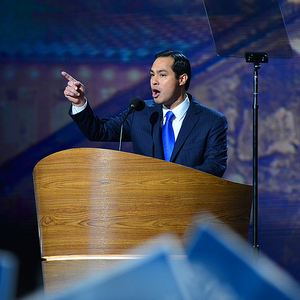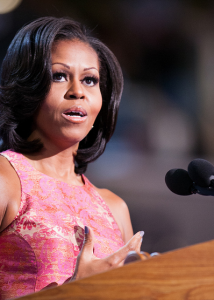Julian Castro or Michelle Obama–Who Succeeded at the DNC?

Some people get excited by football. I hoot and holler and jump on my couch during key speeches such as last night’s at the Democratic National Convention.
Before tonight’s main speeches, one of the CNN commentators said, “If you tell people what they already know, they stay where they are.” This was the challenge that Julian Castro and Michelle Obama faced.
For the first time in history–first time–a Latino delivered a keynote speech at the Democratic National Convention. San Antonio’s 37-year-old mayor spoke with the passion of a generation, my generation, who had to reawaken its political consciousness.
I feared that Castro would replay the son-of-immigrants story who pulled himself up by his bootstraps. He didn’t fail. But he didn’t succeed in mobilizing the Democratic Party or Latinos. He made the Latino community look good. But he didn’t deliver the message that we need to be–that we can be–a political force to drive change led by the Democratic party.
Here’s why: while his speech was strong with stories and emotional connections, he had too many stories that made the speech forgettable because there were too many ideas we could hold on to.
 A little after he turned the focus to President Obama after his opening, Castro said the dream to succeed is universal but our country makes it possible. Then he mentioned the boot straps. Even though these were only hints at cliches, they hit on the expected and created an opportunity for the audience to detach from his speech instead of moving forward with him. As the CNN commentator said, we already know this. We’re not going to move.
A little after he turned the focus to President Obama after his opening, Castro said the dream to succeed is universal but our country makes it possible. Then he mentioned the boot straps. Even though these were only hints at cliches, they hit on the expected and created an opportunity for the audience to detach from his speech instead of moving forward with him. As the CNN commentator said, we already know this. We’re not going to move.
I feared the speech would be soaked in neutrality and emphasize his and his brother’s success, but, to his credit, Mayor Castro threw some punches. He said that the difference between his high school peers and his ivy league peers was “not intelligence or drive. The difference was opportunity.” Then he emphasized the need to invest in opportunity today. Good move there.
He went on to say that Romney doesn’t realize how good he’s had it. And Castro reminded us that “if we severe the threads that connect us, the only people who will go far are those who are already ahead.” Better move. But weak. We know this. He’s not moving us forward with him. It just sounds nicer than the way we would have said it.
Then he had that audience participation section: “Mitt Romney said NO.” The speaker right before him used the same approach. Castro overused it. Again, another emphasis competing with too many other key ideas.
I didn’t realize how ordinary his speech was until Michelle Obama spoke. While Castro moved the audience to cheer, the first lady moved us to action.
The high point was this–when Michelle Obama referenced her daughters:
“Because today, I know from experience that if I truly want to leave a better world for my daughters, and all our sons and daughters…if we want to give all our children a foundation for their dreams and opportunities worthy of their promise…if we want to give them that sense of limitless possibility – that belief that here in America, there is always something better out there if you’re willing to work for it…then we must work like never before…and we must once again come together and stand together for the man we can trust to keep moving this great country forward…my husband, our President, President Barack Obama.”
One sentence. Unified.
Castro, on the other hand, looked forward to his daughter’s success as if it is almost guaranteed:
“She’s still young, and her dreams are far off yet, but I hope she’ll reach them. As a dad, I’m going to do my part, and I know she’ll do hers. But our responsibility as a nation is to come together and do our part, as one community, one United States of America, to ensure opportunity for all of our children.”
He separated his reality in the first two sentences from the rest of the nation in the last sentence.
Many, many more Americans can relate to Michelle’s view than Julian’s.
Castro made an impact but had too many threads for the audience to follow and remember: his grandmother’s story, his mother’s, his own, his daughter’s, references to religion. He started strong with the investment in opportunity but then it got muddy. I found it interesting that he didn’t throw the ultimate punch–a reference (even subtextual)–to immigration reform.
And while Michelle Obama didn’t go there either, she did emphasize the need for a woman to be able to make her own health decisions. As she mentioned the political, she weaved in the personal. She made us believe that her and her husband’s rise to success is somehow more attainable than Castro’s. Ivy league graduates always, in my experience, slip in their alma mater within about 10 minutes of meeting someone. Castro did it. Michelle Obama did not.
Michelle Obama’s speech achieved its success because it had the rhetorical element that also grounds her husband’s campaign–unity. The First Lady said, “Doing the impossible is the history of this nation.” THAT is the unifying message that connected every single story she mentioned. Castro, on the other hand, had too many key lines that competed.
Castro’s lines moved us to cheer; Michelle Obama moved us to action.
My favorite move by Michelle Obama? When she spoke about her father’s commitment to her family, she said, “That’s what being a man was.” She maintained unity by saying that President Obama “was still the man . . . .was still the man . . .” But Castro’s closing made reference to a marathon and a sprint and then went back to his grandmother and her blessing. Too much, too familiar, and too disconnected from the opening.
Castro’s speech is something too many Latinos, too many Americans, know.
Michelle Obama’s speech is something we know, but it also gives us something to do.
What do you think of Julian Castro’s speech? What do you think of Michelle Obama’s?


